SATURDAY CLUB

The Saturday Club is a meeting of an interdisciplinary group of researchers and is conducted by the AYUSH Center of Excellence, Department of Health Sciences, Savitribai Phule Pune University on every first Saturday of the month to discuss varied topics and research areas.
In each meeting, few experts are invited to give an overview of their field of expertise, followed by Q&A session and discussion on avenues for research. These meetings are open to students, researchers and faculty members. The objective is to provide a platform to promote the development of new research ideas and interdisciplinary collaborations among the participants.
(3rd July 2021)
As a scientist, there are many ways to look at beauty. Our conventional definition of beauty, be it a painting by Vermeer or a composition by A. R. Rahman, could be rooted in how our minds perceive beauty. Could that explain why there is beauty for many in Ramanujan’s equations or in how the mitochondria use actin tails to distribute equally between dividing cells? Could beauty hence just be a form of curiosity?
Dr Balasubramanian Nagraj, a cell-biologist by training, pursued PhD in Biochemistry from ACTREC, Tata Memorial Center and post-doc in mammalian phototransduction at the University of Miami, explored some of these questions with the help of various paintings and wildlife images during this Saturday Club.
(1st May 2021)
The progressing of the COVID-19 pandemic and evolving understanding of the scientists was discussed during this Saturday club. Guest speakers including Dr Ravi Ghooi (Senior Scientist and Director, Scientia Clinical Services), Dr Pawan Dhar (Professor and Director, School of Biotechnology, Jawaharlal Nehru University), Dr Shailesh Deshpande (Head, Education Department, Chellaram Diabetes Institute) having diverse expertise shared their knowledge about COVID-19 pandemic with all the participants.
Discussion took place regarding the Science emerging and evidence obtained from trials implemented in health care systems of the world. They also discussed vaccine trials carried out worldwide and efficacy of vaccines in various clinical trials worldwide.
(6th February 2021)
AYUSH Center of Excellence resumed Saturday Club after COVID-19 with its online session entitled ‘New Beginning with Swami Vivekananda’. This is certainly a time to understand and inculcate the thoughts of the great visionary leader for they will surely help us to take proactive steps during various challenges faced in our professional and personal lives.
Prof. Narendra Naidu, Head, Department of Zoology, Modern College of Arts, Science and Commerce, Pune is sharing Swami Vivekananda’s thoughts for youth. The virtual exhibition, ‘Creativity in lockdown’, showcased creativity during lockdown by our team member Ms. Kalyani Kumbhare which included Mandala Art.
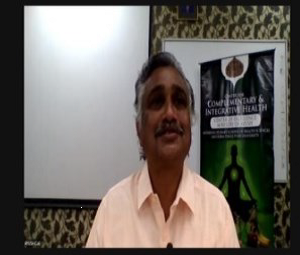
(3rd August 2019)
Fermentation is a metabolic process in which organic substances undergo chemical changes through enzymatic actions. We consume many food items that are the products of fermentation. In this Saturday club three different topics related to the health benefits of the fermentation process were discussed.
Dr Milind Patole, a Senior Scientist from the National Centre for Cell Sciences shared a story of his research on Idli employing molecular tools that discovered the bacterial diversity enabling its fermentation. His research should help in making this traditional Indian recipe a functional food because of its beneficial properties. He has published his research work in Applied and Environmental Microbiology.
Dr Sarika Mane, a researcher from Interactive Research School for Health Affairs (IRSHA), Pune, presented her research on natural yeast flora of grapes and its significance in wine making. Dr. Sarika’s research explained diversity in indigenous yeast strains, and how the qualitative and quantitative changes in the flora during fermentation affect wine quality. Her work has been published in Food Microbiology.
Ms. Sheetal Pardeshi, Assistant Professor at the Department of Microbiology, Modern College, talked about preliminary findings of the exploration of the endophytic microbial community structure before and during the fermentation of Asvagandharishta. Recent research by her team, supported by the AYUSH Center of Excellence, studied cultural microbial diversity of plant components used in Asvagandharishta preparation and changes in microbial abundances during its fermentation. This research will also help in exploring the roles of organisms in this Ayurvedic preparations.
(4th May 2019)
Social media has become an integral part of our life today. There’s no denying that it has touched people from every walk of life and has taken some space in our lives. Now whether we will use social media or will use it will depend on how intelligently we handle it. In order to progress, it is pertinent not become slaves of social media but to use it effectively. It is important to understand how and why social media can be dangerous as well as a liberating phenomenon. Is social media a voice of our generation or is it the invisible, attractive, dopamine addictive chain of slavery? For this Saturday Club, we had experts from social media who discussed very new topics.
Mr Sudhanva Joglekar, an engineer with over 31 years of experience in the IT industry. His experience lies in the areas of customer support to start with and then evolved to system administration, network administration and further to information security. He is also well versed with operating systems like UNIX, Windows, Linux (multiple variants of OS), access controls, firewalls, information security and has been coordinating Pune Linux Users Group for 17 years. Apart from these activities, Mr Joglekar is also active in Wikipedia activities and was the President of Wikimedia, India. He discussed the use of Wikipedia in our lives and authenticity of information available on the web. He explained the process of contributing the information in wiki.
Dr. Abhijeet Safai, Research Officer - SCOPE - Symbiosis International (Deemed University). He is a medical doctor with training and experience in clinical research, clinical data management, analysis and human research ethics. Dr. Safai is also an SAS Certified Base Programmer. He is also active on social media and regularly writes for his blog and Wikipedia. Dr Safai elaborated the use of social media for the good of society in a scientific way. He shared his experience of using social media in an appropriate manner. This interactive session was well received by the audience.
The recently inaugurated Research Park at SPPU promises to foster applied research and entrepreneurship and will host start-ups as well as a co-location facility for industrial research and development. Dr. Avinash Joshi, CEO of the SPPU Research Park Foundation. He was a founder member and formerly Head -Technology solutions, CanvasM (a Tech Mahindra and Motorola JV company) talked about the Research Park and its activities. Dr Joshi, had over 25 years of experience in the area of telecommunication networks and applications. He had experience in innovation, strategy, consulting, R&D, pre-sales-delivery and setting up technology and applications labs. He explained the thought process behind establishing the Research Park and the need of outreaching the research work. He also informed the audience regarding public participation, society’s involvement, process of organizing visits to Research Park and many more such components by which research park can be useful to the society.
(4th April 2019)
AYUSH Center of Excellence and Center for Complementary and Integrative Health, Savitribai Phule Pune University organized a lecture by Dr Dilip Ghosh. This interactive session on transition from personalized medicine to personalized nutrition provided an opportunity for researchers, students and clinicians an insight to the vast field of nutrigenomics, diet as therapy, natural medicine and functional foods.
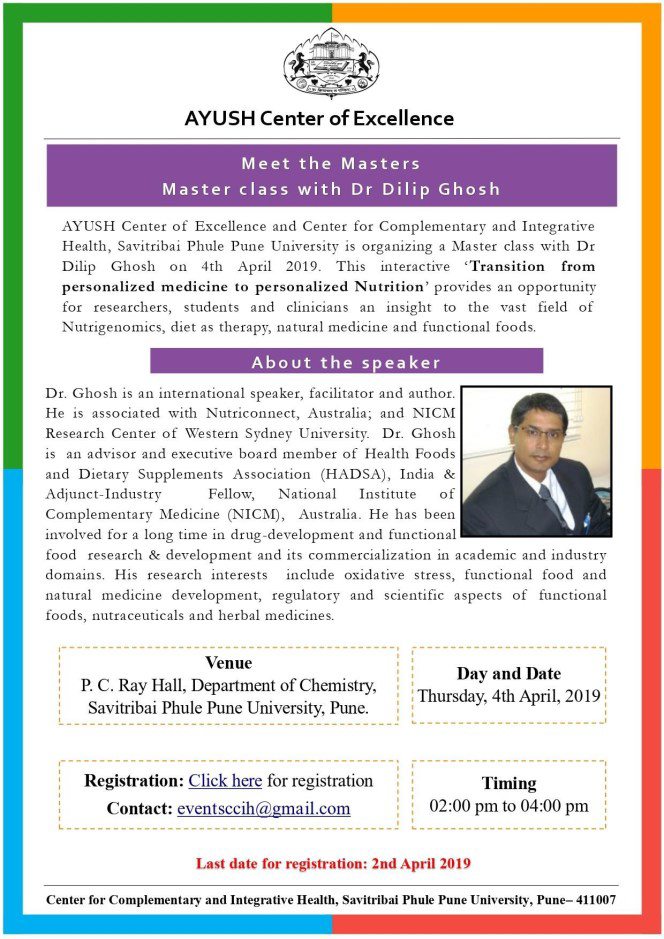
(2nd March 2019)
The Saturday Club – Brainstorming meeting for research ideas focused on ‘Machine Learning and Healthcare’. The invited speakers talked about how technology has progressed and machines have transformed every aspect of human life. They also spoke on how machine learning can be used for disease diagnosis and how technology is changing the face of healthcare.
Ms Vijeta Sharma, an engineer from Centre for Development of Advanced Computing (C-DAC) provided an overview of machine learning. She is working in the field of Artificial Intelligence, machine learning, cloud computing and big data analytics. Her projects included intelligent video analytics for development of smart cities, artificial neural network models for diabetes prediction, prediction model for malaria outbreak and study of disease distribution to develop cloud-based disease surveillance systems. She explained what machine learning is and its need and applications in healthcare.
.png)
.png)
Mr Nilesh Pai, a production engineer and a principal consultant in life sciences domain at Infosys. He is also responsible for providing domain-based services to leading pharma giants like Pfizer, Novartis, and AstraZeneca. He is managing an Artificial Intelligence platform development for Medtronics Mini Med Corporation that specializes in diabetes management. He shared his experiences about current industry trends and a project on artificial intelligence and machine learning applied for managing effectively type 1 diabetes. The project involved a device which can intelligently detect blood sugar levels in patients with type1 diabetes.
Dr Aditya Abhyankar, Head, Department of Technology, Savitribai Phule Pune University, spoke on kernels evaluation and trends in machine learning. Dr Abhyankar’s vast experience in this area includes signal and image processing, pattern recognition, wavelength analysis, biometric systems and bioinformatics, machine learning, computer vision, and big data analytics. He discussed about adaptive machines which are capable of solving real life problems with engineered solutions.
.png)
(5th January 2019)
Mr Amit Kulkarni, a computer engineer, with more than 20 years of experience in various technologies as well as in pharmaceutical and healthcare domain, shared his journey from computer engineering to Yoga education and research. Mr. Kulkarni got attracted towards Yoga and completed his M.Sc. in Yoga from S-VYASA University, Bengaluru. He shared his experiences with Yoga. One of the experiences shared was about a community-based study of which he was a part of and which employed various Yoga interventions for diabetes mellitus with patients with hypertension in order to improve their quality of life.
The second session of the day was conducted by Dr Nilangi Sardespande, an Ayurveda physician who did a Ph.D. from Tata Institute of Social Sciences after completing Masters in Health Sciences. Dr. Sardespande has worked with voluntary organizations and international institutions and had experience of almost two decades. Her research areas include health equity, nutrition, women’s access to health care and health budgets. She interacted with the audience and shared her journey and perspective at looking towards Ayurveda and its applications in public health.
Dr Prashant Duraphe has worked on chronobiology research in Universities of Düsseldorf and Würzburg, Germany. He has established the Institute of Chronobiology Education and Research (ICER) in Pune. Dr Duraphe explained chronobiology and its importance in regulating numerous physiological processes. He also spoke on various research updates in chronobiology and its applications in clinical practice.
(3rd November 2018)
The meeting was focused on the topic ‘health and fitness concepts of AYUSH’. In this meeting Mr. Mahendra Gokhale, an athlete and fitness trainer, discussed his innovative program ‘Fitness Makeover’ and shared experiences from the program customized for individual needs. He explained that the concept of fitness goes beyond reactionary and reductionist approaches against diseases. Mr Rupesh Khopde of Giripremi, one of the pioneering mountaineering clubs of India, spoke on how he prepared for his expedition to the World's highest mountain, Mt. Everest in 2012. He talked about health and physiological adaptations in such a scenario and how mental qualities along with physical abilities are important especially in adverse climatic conditions.
(1st September 2018)
The theme of Nutrition and Dietetics was considered on the occasion of the National Nutrition Week from 1st to 7th September 2018. Approximately 60 participants from various backgrounds ranging from scientists, practitioners, students and researchers attended the meeting. The following sessions were conducted as a part of the Saturday club activity.
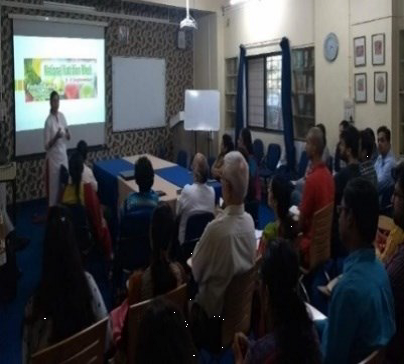
Subhashitas are verses which elaborate concepts in poetic language. Various Subhashitas have elaborated concepts of food, health, how to eat according to seasons and one’s Prakriti. Dr. Sachin Kulkarni, Associate Professor, Bharati Vidyapeeth Deemed University, explained such a few verses and discussed its relevance with daily diet routine.
Dr Geeta Dharmatti, Dietician and consultant, Chief Nutrigenomics Counsellor to Gene Support and Executive Member of Indian Dietetic Association was invited for a talk on current scenario in dietetics practices. She elaborated about the scope for practice in dietetics and upcoming challenges due to increasing burden of metabolic diseases especially obesity. She also emphasized the importance of integrating the modern dietetics concepts with ancient Ayurvedic knowledge of dietetics to tackle the current challenges in the Indian scenario of dietary choices.
.png)
The growing demand and interest in herbal teas has led to formulating products with sound science behind it. The importance of Guna, Dravya and Rasa of the herbal tea was discussed during this meeting. The organoleptic evaluation of 7 samples of herbal teas prepared from various medicinal plants was done by the participants.
(4th August 2018)
Mr Chetan Deshpande, Biomarker Operations Lead, Pfizer, United States and Mrs Meghana Deshpande, PK Immunogenicity Lead, Pfizer, United States shared their research experiences in the area of Immunology and Microbiology. In an interactive session, Mr and Mrs Deshpande shared observations and current research trends in the biopharma industry. The participants of this Saturday Club were from different backgrounds like Ayurveda practitioners, public health researchers, modern medicine practitioners, pharmaceutical science researchers as well as master’s students.
Ms Kiran Hendre, a Yoga athlete, discussed her experiences of Yoga training at S-VYASA University. She also conducted a session on ‘Chair Yoga’ that includes various easy-to-follow chair postures, breathing practices, and quick relaxation techniques. Chair Yoga is beneficial for improving strength, stress, and pain management.
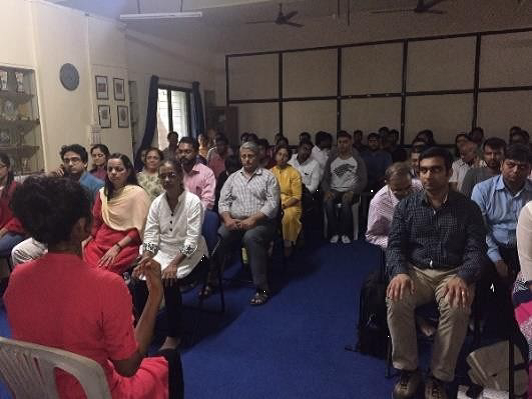
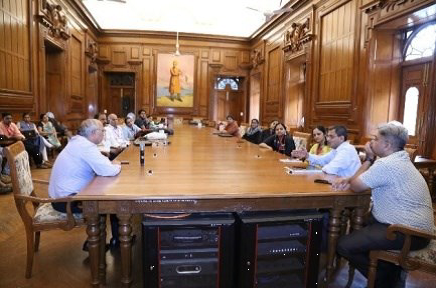
(7th July 2018)
Dr Ravindra Ghooi, senior pharmacologist expert in research ethics, interacted with participants on various topics of science, ethics and philosophy. He discussed how these fundamental concepts drive research activities. He narrated efforts for making morphine available for pain management in terminal cases of cancer through the courts of India. The participants interacted on various aspects of clinical research during this talk.
(2nd June 2018)
The emerging research on microbiome and its role in human health and disease was discussed in a brainstorming session with Dr Yogesh Shouche, Director, National Center for Microbial Research, Pune. Dr. Shouche has over 28 years of experience in working in the area of microbial ecology, microbial molecular taxonomy and biodiversity. The interactive session with Dr Shouche on various topics ranging from use of traditional fermented recipes and its effect on gut health, gut microbiome and diabetes, and omnipresence of microbes in our life was conducted.
(5th May 2018)
The Saturday Club of May 2018 had diverse subjects to present. One describes the global perspective of Ayurveda whereas the other represents the ethical approaches for publication.
Senior professors of Ayurveda Dr. (Mr.) Subhash Ranade and Dr. (Mrs.) Sunanda Ranade discussed their experiences and observations on 'Globalization of Ayurveda and Yoga'. As a Global Ambassador Ayurveda. They both had visited more than 75 countries in the last four decades to teach Ayurveda along with preventive and promotive health. They have witnessed how Ayurveda and Yoga have affected western minds and how they are being practiced throughout the world. They interacted with the audience about the status and opportunities of Ayurveda practice and research.
.png)
.png)
Researchers should be aware of the quality and authenticity of scientific material they read. The knowledge of Scientometrics is crucial in the background of low-quality journals. Scientometrics is about measuring science. It deals with analysis of impact for journals, institutes, and scientists. Dr Shubhada Nagarkar, Fulbright Scholar, Ph.D. in Library and Information Science from Department of Library and Information Science, Savitribai Phule Pune University, discussed various concepts and methods such as citation analysis, impact factor and other indicators. The discussions on assessing research outcomes as a paper, was helpful to the audience.
(21st April 2018)
A brainstorming session on development of E-pedagogy was conducted and Mr. Rajesh Vartak, Chief Technical Officer, Seed Infotech, Pune was invited for this session. The contributing faculty members of the Integrative Dietetics course were also present. Mr. Vartak explained managing cognitive overload during class sessions, pros and cons of MOOCs and the blended learning way to successful conduction of a course. The concept of Andragogy was also introduced. This brainstorming session led to the review of the current teaching methods as well as reviewing the syllabus for better capacity building of the course participants.
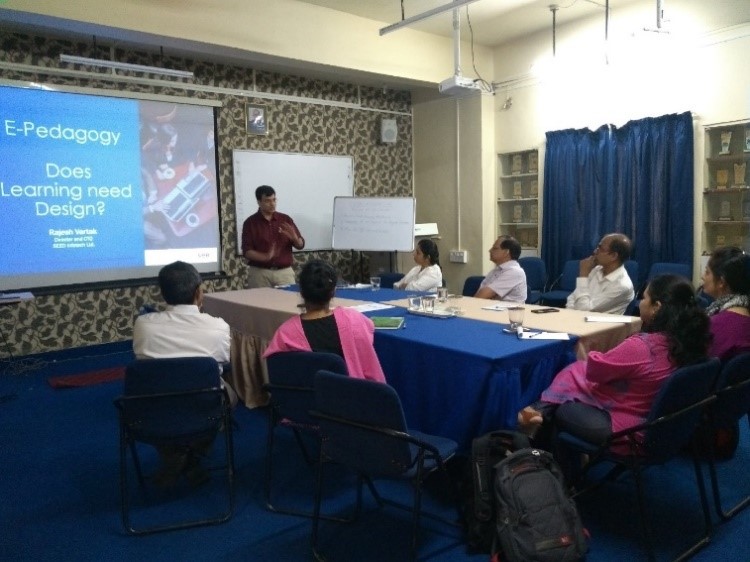
(7th April 2018)
April 7th is celebrated as World Health Day across the world. As per initiatives from the World Health Organization, this year’s theme for World Health Day was Universal Health Coverage: Everyone, Everywhere. The importance of strengthening and integrating AYUSH systems in achieving the goal of Universal Health Coverage was discussed with students by Dr Girish Tillu. The interactive session included discussion on how various methods can be applied in providing health coverage to all on grass root level.
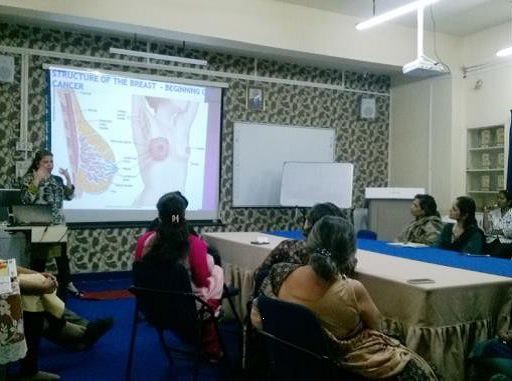
(3rd March 2018)
This meeting was focused on statistics along with the public health perspective of breast cancer and disability. Ms. Laleh Busheri, CEO, Prashanti Cancer Care Mission, Pune and Pink-Ribbon Support Group discussed various activities of this group and highlighted the importance of rehabilitation of breast cancer patients beyond the walls of a cancer clinic. Ms. Charuta Gokhle, a Ph.D. student working in the field of disabilities at Department of Health sciences, SPPU talked about disability from an Indian perspective on the occasion of World Birth Defects Day on 3rd March. Dr. Sharvaree Shukla continued the topics on Biostatistics. She explained concepts and applications of ‘Confidence Interval’.
(3rd February 2018)
This meeting included statistics and health consultancy practices. Dr Sharvaree Shukla, Professor of Statistics, discussed the importance of distinguishing and interpreting error bars. Dr Sudhanshu Takawale, a sports medicine specialist, shared his experience about moving from routine medical practice to health consultation. His topic ‘medical practice to health consultation’ presented clinical cases of change in behaviour and conscious modulations in eating and drinking habits that contribute to health and happiness.
(6th January 2018)
The focus of the meeting was on lifestyle and behavioural health. Dr. Hyndavi Salva, a Naturopath at National Institute of Naturopathy, Pune and Ph.D. scholar of Department of Health sciences presented physiological effects of sunlight. Dr. Pradeep M. K., a consultant of National Institute of Naturopathy, Pune and Ph.D. scholar of Department of Health sciences, discussed physiological effects of fasting.
Dr Pramod Khandekar, Former Chair Professor, Biotechnology and Dan 1 Black belt, KUKIWON shared his experiences on ‘Tae Kwon Do: Yoga in motion and role in health’. He discussed the philosophy of Tae Kwon Do and various studies in addition to personal experience.
Copyright © Savitribai Phule Pune University, School of Health Sciences, Pune. All Rights Reserved.
[Best viewed in IE 10+, Firefox, Chrome, Safari, Opera.]
:::| powered by dimakh consultants |:::